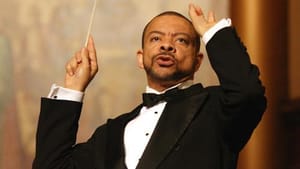Stay in the Loop
BSR publishes on a weekly schedule, with an email newsletter every Wednesday and Thursday morning. There’s no paywall, and subscribing is always free.
War and peace, music and politics
A Sunday with AVA and Chestnut Street Singers

In the course of a single Sunday, I heard arias by Bach, Handel, and Mozart, along with two of my favorite songs about the human fondness for organized mayhem. The arias included gems like Handel’s Let the Bright Seraphim and Mozart’s Laudamus Te from his Grand Mass in C Minor. The war songs were the Agincourt Song, which celebrates Henry V’s famous victory, and "Johnny I Hardly Knew Ye," which laments the loss of limbs and eyes to the tune most of us know as "When Johnny Comes Marching Home Again."
The arias were part of an annual program of instantly recognizable sacred music presented by the Academy of Vocal Arts, an 80-year-old school that attracts advanced vocal students from all over the world. The two war songs, by contrast, were sung by the Chestnut Street Singers, a “cooperative chamber chorus” organized just four years ago by 16 part-time singers — experienced choral enthusiasts, many with music education degrees, who last weekend sang works by less familiar composers like Kirke Mechem (He composed the music for Paul Laurence Dunbar’s poem, "Sympathy").
Together, the two programs captured some of the scope and variety of the vocal music pigeonholed under the “classical music” label.
When I told a musical acquaintance that I hoped to attend both events and cover them in a single review, she immediately understood why. “That’s Philadelphia,” she said.
Conflicting attitudes
You can be certain you’ll hear first-rate voices when you attend “Jubilate!,” and this year’s crop of AVA Resident Artists sounded especially impressive. But I was equally impressed with the way AVA’s conductor David Lofton modified the orchestra’s sound as the program advanced through the musical eras, from the brighter, thinner sound of Baroque music to the fuller, more emotional sound of 19th-century works by Gounod and Rossini.
The Chestnut Street Singers titled their program “To Arms: Songs of Strife and Reconciliation,” and their selections captured all the tension created by humanity’s conflicting attitudes toward war. The program included songs devoted to peace and serenity, interspersed with more martial fare like the Agincourt Song and a Renaissance battle piece that reveled in the clamor and excitement of war, with no indication the composer recognized the realities mourned in "Johnny I Hardly Knew Ye."
Pro-Communist, anti-Hitler
In fairness to the AVA concert, I should note that it did end with three works by more contemporary composers. My favorite was a teacher’s prayer that combined a nursery rhyme text with a childlike musical setting by Kristina Nicole Lewis.
The Chestnut Street program, on the other hand, included two works by composers with upper level name recognition: a Da pacem, Domine (“Grant peace, O Lord”) by the Estonian composer Arvo Pärt and Benjamin Britten’s unpredictable, strikingly complex setting of a 1939 pro-Communist anti-war poem, Advance Democracy.
The Britten piece evoked the most conflicting emotions in this particular listener. For those of us who grew up in the shadow of the Second World War, the text reflects the attitudes that supported the appeasement of Hitler and led the world into war.
But that raises an interesting question. The AVA concert included an Ave Maria by Gounod with another striking setting. Soprano Marina Costa-Jackson sang it with well-moderated reverence, while Sophie Bruno and concertmaster Igor Szwec accompanied her on harp and violin, with Szwec contributing an especially sweet violin solo. The problem for me is that I’m an areligious urbanite raised in the Protestant tradition; the Ave Maria doesn’t mean any more to me than the text of Advance Democracy. So why, then, should I feel that the call to overthrow the bosses in Advance Democracy is any more troublesome than the Ave Maria’s prayer to the Virgin Mary?
The answer, of course, is that I should listen to Advance Democracy in exactly the same way I listen to an Ave Maria. The exercise might even provide some practical value. When you listen to music based on a religious or political text, you are, to some extent, sharing the feelings of the people who believe in those words. Add enough of those moments to your life and you may — possibly — just possibly — become a little more understanding and a little less inclined to strike at those who differ with you, physically or verbally.
What, When, Where
Chestnut Street Singers: “To Arms: Songs of Strife and Reconciliation.” Songs by Britten, Pärt, Mechem, and others. March 16, 2014 at First Unitarian Church, 2125 Chestnut St., Philadelphia. www.chestnutstreetsingers.org.
Academy of Vocal Arts Resident Artists: “Jubilate!” Sacred music by Handel, Bach, Haydn, Mendelssohn, Gounod, Rossini, and others. David Antony Lofton, conductor. March 16, 2014 at Church of the Holy Trinity, Rittenhouse Square, Philadelphia. 215-735-1685 or www.avaopera.org.
Sign up for our newsletter
All of the week's new articles, all in one place. Sign up for the free weekly BSR newsletters, and don't miss a conversation.

 Tom Purdom
Tom Purdom